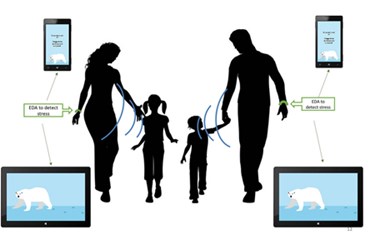First System To Detect Stress And Provide Real-Time Coping Advice
By Joel Lindsey

Scientists at the University of California, San Diego (UCSD) and Microsoft Research have created a new device designed to detect a parent's or guardian's highest moments of stress and provide real-time advice for how best to cope with that stress.
"Instead of focusing on an individual in need we are looking at how to build and design technology for the family as a whole and what's beneficial for them," Laura Pina, a PhD student at UCSD and lead researcher on the project, said in a press release published recently on the university's website. "We wanted to help parents to be the parents they want to be."
The device, called ParentGuardian, comprises four main components: a wrist sensor to monitor fluctuations in electrical activity on the wearer's skin that indicate a change in stress level, a smartphone and tablet that display advice and reminders for how best to cope with the stress, and a backend computer server that aggregates and analyzes the data picked up by the sensor.
In initial tests of the device, which involved 10 parents with ADHD children, ParentGuardian accurately detected stress 78 percent of the time, and parents who participated in the trial reported an average satisfaction rating of 5.1 on a scale of 1 to 7, according to UCSD.
During the first week of testing, parents wore the wrist sensors while also self-reporting moments of high stress. Using a specialized algorithm, ParentGuardian combined the data gathered both by the wrist sensor and the self-reporting in order to fine-tune the system's responsiveness to specific users.
After a week of "training" the device, parents used the full ParentGuardian system and began receiving advice for how to handle moments of high stress. The messages sent to parents' smartphones and tablets were based on the techniques of Parenting Behavioral Therapy, which has proven effective in helping parents address the needs of ADHD children, according to UCSD's press release.
With initial tests complete, Pina and the rest of the research team hope to make the device more relevant to a wider range of parents and caretakers. Feedback from the first tests also reveals a need to detect stress and send messages before stress reaches its peak.
"System design has to be very sensitive to the context of using it in real life, with real people," Pina said.
Image Credit: UCSD Jacobs School of Engineering
